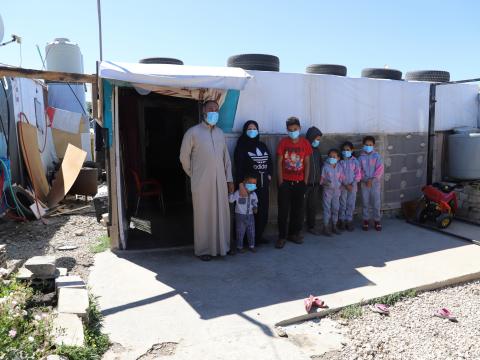Syrian refugees remain resilient to COVID-19

The economic recession provoked by COVID-19, in addition to the huge inflation in prices has pushed thousands of Syrian refugee families in Lebanon into more vulnerability and dramatically increased their needs for urgent support.
Looking for a safer and better life, Hanaa and her family escaped the harsh war in her homeland Syria and settled in the Bekaa Valley five years ago. “Our house was destroyed, so I took my seven children and fled to Lebanon. The journey was very difficult. it took us six hours to cross the borders across the mountains. When we first arrived at the other side, the traffickers took our money otherwise they threatened to shoot us,” says Hanaa. “Despite living in a tent, it’s much better than living under bombs. We got used to our life here, and I don’t think we will be going back to Syria in the near future,” she adds.
Hanaa’s husband, Khleif, who arrived in Lebanon seven months before his family escaping the terrorist groups, never imagined that misfortune will follow him to Lebanon. “I haven’t been able to find work for a year and a half. I used to work as a tailor and now due to the recent economic crisis all job opportunities vanished,” he says. “We are now living either on humanitarian assistance or debt. I have a three million Lebanese pound debt and I don’t know how I am going to pay it.” He adds
World Vision, with support from UNICEF and funding provided by the United States government and the government of Canada, provided Hanna and her family with water trucking and desludging services. “Thank god that World Vision is providing us with clean water. Water is the most important thing for a healthy and clean life. Without this essential support, our situation would have been much worse,” explains Hanaa.
Since the COVID-19 outbreak, the family has been experiencing further stress and anxiety every single day. “At first, we did not know what to do, so we locked ourselves inside without welcoming anyone. We didn’t want to put our children’s lives at risk,” says Khleif. “World Vision provided us with soap, bleach bottle and sanitizers. They also trained our children on how to properly clean their hands and take the right precautions. Now, whenever I want to go outside to get some stuff, I make sure I am wearing a mask. I make sure to wash my hands first thing when I’m back in the tent,” he adds.
“Since schools are closed, the children are reviewing their study material daily and watching some educational programs on the phone. When they are bored, they can play just in front of the tent but not far,” says Hanaa. “We will try to stay resilient to all the problems we are facing. I hope our financial situation will get better soon so we can go back to normal life and our children to school,” adds Hanaa.
As part of World Vision response to COVID-19, the WASH team has distributed soap and flyers in 426 informal settlements reaching 28,740 Syrian refugees in the Bekaa of which 17,244 are children. Also, the team has distributed 7432 bleach gallons and 14864 hand sanitisers in hope of slowing down the spread of the disease.
Learn more about and/or support World Vision’s global work to limit the spread of COVID-19 and support the children impacted by it on our COVID-19 Emergency Response Page.